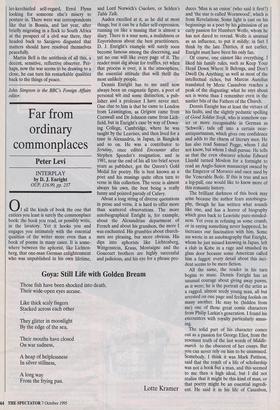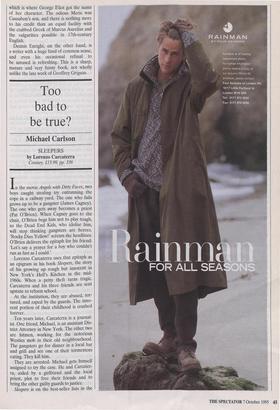Far from ordinary commonplaces
Peter Levi
INTERPLAY by D. J. Enright OUP, £16.99, pp. 237 f all the kinds of book the one that entices you least is surely the commonplace book: the book you read, or possibly write, in the lavatory. Yet it hooks you and engages you intimately with the essential qualities of the writer more even than a book of poems in many cases. It is some- where between the aphorist, like Lichten- berg, that one-man German enlightenment who was unpublished in his own lifetime, and Lord Norwich's Crackers, or Selden's Table Talk.
Auden excelled at it, as he did at most things, but it can be a fuller self-expression, running on like a musing that is almost a diary. There is a sour note, a mulishness or Eeyorishness about the best practitioners. D. J. Enright's example will surely soon become famous among the discerning, and yet no one will like every page of it. The reader must dig about for truffles, yet when that process is over, it is the atmosphere, the essential attitude that will thrill the most unlikely people.
Dennis Enright has to me until now always been an enigmatic figure, a poet of personal wit and some distinction, a pub- lisher and a professor I have never met. One clue to him is that he came to London from Leamington, as Grigson came from Cornwall and Dr Johnson came from Lich- field, but in Enright's case by way of Down- ing College, Cambridge, where he was taught by the Leavises, and then lived for a time in Alexandria, in Japan, in Bangkok and so on. He was a contributor to Scrutiny, once edited Encounter after Stephen Spender's resignation, and in 1981, near the end of his all too brief seven years as publisher, got the Queen's Gold Medal for poetry. He is best known as a poet and his musings quite often turn to verse in this collection. The verse is almost always his own, the best being a really funny and pointed parody of Cafavy.
About a long string of diverse quotations in prose and verse, it is hard to offer more than scattered observations. The more autobiographical Enright is, for example, about the Alexandrian department of French and about his grandson, the more I was enchanted. His grumbles about church- men are pleasing, but more obvious. His dips into aphorists like Lichtenberg, Wittgenstein, Kraus, Montaigne and the Goncourt brothers are highly successful and judicious, and his eye for a phrase pro- duces 'Man is an onion' (who said it first?) and 'the star is called Wormwood', which is from Revelations. Some light is cast on his beginnings as a poet by his ,dmission of an early passion for Humbert Wolfe, whom he has not dared to reread. Wolfe is unusual as an influence, to put it mildly; in fact I think by the late Thirties, if not earlier, Enright must have been his only fan.
Of course, one cannot like everything. I liked his family rules, such as Keep Your Head Down Where It Belongs, and Don't Dwell On Anything, as well as most of the intellectual riches, but Marcus Aurelius translated by Meric Casaubon reaches a peak of the disgusting: what he says about sex is worse than I remember even in the nastier bits of the Fathers of the Church.
Dennis Enright has at least the virtues of his faults, and the slightly pedantic spelling of Good Soldier Svejk, who is somehow eas- ier or more recognisable in German as `Schweik', tails off into a certain near- antiquarianism, which gives one confidence and adds to the charm of literary men. He has also read Samuel Pegge, whom I did not know, but whom I shall pursue. He tells us that the even obscurer scholar Edward Lluydd turned Moslem for a fortnight to read an Anglo-Saxon manuscript owned by the Emperor of Morocco and once used by the Venerable Bede. If this is true and not a leg-pull, one would like to know more of this romantic history.
The brilliant darkness of this book may arise because the author fears autobiogra- phy, though he has written what sounds like one, and has a horror of biography which goes back to Leavisite pure-minded- ness. Yet even in refusing us some crumb, or in saying something never happened, he increases our fascination with him. Some ass wrote in an autobiography that Enright, whom he just missed knowing in Japan, left a club in Kobe in a rage and smashed its glass door because some American called him a faggot: every detail about this inci- dent seems to be mere fiction.
All the same, the reader in his turn begins to muse. Dennis Enright has an unusual courage about giving away pawns, as it were; he is the portrait of the artist as a ragged, almost seedy young man, all but arrested on one page and feeling foolish on many another. He may be (hidden from me) one of those great comic characters from Philip Larkin's generation. I found his encounters with royalty particularly amus- ing.
The solid part of his character comes out as a passion for George Eliot, from the resonant truth of the last words of Middle- march to the obscurest of her essays. But you can never rely on him to be unamused. Somebody, I think it was Mark Pattison, said that the reqult of a life of scholarship was not a book but a man, and this seemed to me then a high ideal, but I did not realise that it might be this kind of man, or that poetry might be an essential ingredi- ent. He said it in his life of Casaubon, which is where George Eliot got the name of her character. The odious Meric was Casaubon's son, and there is nothing more to his credit than an equal facility with the crabbed Greek of Marcus Aurelius and the vulgarities possible in 17th-century English.
Dennis Enright, on the other hand, is a writer with a huge fund of common sense, and even his occasional refusal to be amused is refreshing. This is a sharp, mature and very funny book, not wholly unlike the late work of Geoffrey Grigson.











































































 Previous page
Previous page